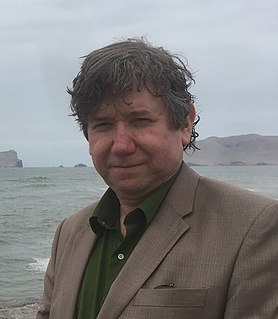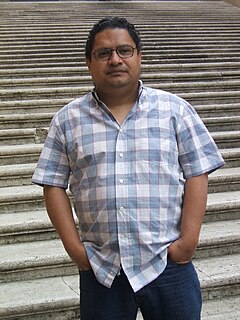Related Research Articles

Mario Orlando Hardy Hamlet Brenno Benedetti Farrugia, was an Uruguayan journalist, novelist, and poet and an integral member of the Generación del 45. Despite publishing more than 80 books and being published in twenty languages he was not well known in the English-speaking world. In the Spanish-speaking world he is considered one of Latin America's most important writers of the latter half of the 20th century.

Aurora de Albornoz was born in Luarca, Asturias, Spain. As a youth, she lived in Luarca with her parents, sister, and extended family, throughout the Spanish Civil War from 1936 to 1939— an event that inspired her later poetry.
The Premio Adonáis, or Adonais Prize for Poetry, is awarded annually in Spain by Ediciones RIALP to an unpublished Spanish language poem. Runners-up are also recognized.
Dina Posada is one of Central America’s poets. Fuego sobre el madero, a collection of poems that celebrate love, eroticism and the female body was published in 1996..

José Luis Vega is a Puerto Rican poet.

Almazán is a municipality located in the province of Soria, Castile and León, Spain. As of 2013, the municipality has a population of 5,843 inhabitants. It is also the seat of the judicial district of Almazán, and ecclesiastically it belongs to the Diocese of Osma, a suffragan diocese of the Archdiocese of Burgos. Connected via the Autovía A-15 and Carretera nacional N-111, it is situated 194 kilometres (121 mi) by road northeast of Madrid. The town lies on the east bank of the Duero river.

Luis (Leopoldo) Franco was an Argentine autodidact, a self-made intellectual, essayist, and poet.

Vicente Gerbasi was a representative poet of Venezuelan 20th century.

José Antonio Mazzotti is a Peruvian poet, scholar, and literary activist. He is Professor of Latin American Literature and King Felipe VI of Spain Professor of Spanish Culture and Civilization in the Department of Romance Studies at Tufts University, President of the International Association of Peruvianists since 1996, and Director of the Revista de Crítica Literaria Latinoamericana since 2010. He is considered an expert in Latin American colonial literature, especially in El Inca Garcilaso de la Vega and the formation of criollo cultures, a critic of Latin American contemporary poetry, and a prominent member of the Peruvian 1980s literary generation. He received the José Lezama Lima special poetry prize from Casa de las Américas, Cuba, in 2018, for his collection El zorro y la luna. Poemas reunidos, 1981-2016.
Justo Jorge Padrón was a Spanish poet, essayist, and translator. His work has been described as confirming "[t]he strength of modern Canarian poetry".

Juan Carlos Chirinos García is a Venezuelan writer and creative writing teacher. He is a novelist, story writer and biographer.
Carlos Hugo Garrido Chalén is a Peruvian poet award winner World Literature "Andres Bello" version poetry, 2009 in Venezuela, this poet has been declared living cultural Heritage of the Nation by the National Institute of Culture (INC) of the Peruvian republic. He studied journalism and law at the National University of Trujillo. Garrido Chalén is one of the present representatives of the North Group that was born in Trujillo city in the first half of the twentieth century.

Marco Antonio Montes de Oca was a Mexican poet and painter.

Mariana Enríquez is an Argentine journalist, novelist, and short story writer.

Francisco de Asís Alarcón Estaba is a Venezuelan writer, poet and editor. Popularly known as Francisco Alarcón, poet and writer whose years of reading, the beginning in romantic literature, transform him into Rolando or Rodrigo Díaz de Vivar, and take him to William Shakespeare, in his opinion, the great interpreter of nature human On that tour, he gives us Chronicles of Caracas, Tales of Gallero, poetry and essays. The intimate world in poems. The poet and writer assumes his commitment as a public intellectual, when faced with the need to understand, to see clearly, he catches the phenomena of the environment and his inner world, and then communicates what is seen and experienced. It is one of the prominent voices of the 80s generation in Venezuela and Latin America. Founder and editor of the Venezuelan digital newspaper, PUBLICACIONES FRANCISCO ALARCÖN in Caracas dated 2000.

Ernestina de Champourcín Morán de Loredo was a Spanish poet. She is most associated with the Generation of '27.
Juana Rosa Pita is a poet, writer, editor and translator. She was born in Havana on December 8, 1939. She left Cuba in 1961. Since then she has lived in many cities, including Washington, Caracas, Madrid, New Orleans, Miami, and Boston, where she currently resides. From 1989 to 1992 she was Visiting Professor at Tulane University. She is considered one of the most important contemporary Cuban and Latin American poets. The late Nicaraguan poet Pablo Antonio Cuadra hailed her as "one of the outstanding voices of Cuba’s pilgrim culture. Book after book Juana Rosa Pita has been creating a mysterious realm of love and prophecy: an island of enchantment where words restore all that hatred turned to ashes."

Faustina Sáez de Melgar, née Faustina Sáez y Soria (1834–1895) was a Spanish writer and journalist. She was mother of the composer and painter Gloria Melgar Sáez.

Manuel Vilas is a Spanish writer. He has achieved distinction in several genres, including poetry, essays, short stories and novels. His latest novel Alegría was a finalist for the Premio Planeta while an earlier book Ordesa won the Prix Femina Étranger.

Gloria Gervitz was a Mexican poet and translator of Ukrainian Jewish descent.
References
- ↑ "Chile repartió medallas Pablo Neruda a figuras de todo el orbe" (in Spanish). Cooperativa.cl. 12 July 2004. Retrieved 18 May 2011.
- 1 2 "Poetas de Bolivia / Pedro Shimose" (in Spanish). Bolivia Web. Retrieved 17 November 2012.
- 1 2 3 4 Biografía de Pedro Shimose (in Spanish), Poemas del Alma, retrieved 17 November 2012
- ↑ "Biografía de Pedro Shimose" (in Spanish). Biografías y Vidas. Retrieved 17 November 2012.